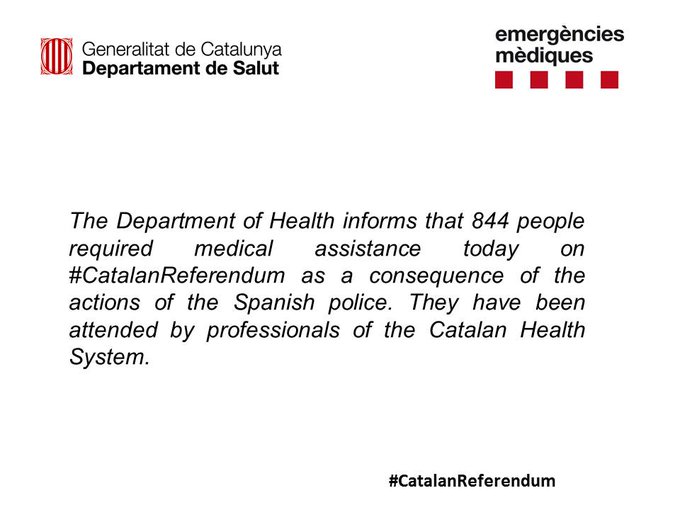The Catalan emergency officials have disclosed that over 761 people were injured on Sunday as police used force to try to block voting in Catalonia’s independence referendum.
This is just as the Catalan Health Department claimed that 844 persons were injured by Spanish police.
Spanish national police launched a widespread crackdown on Catalonia’s disputed independence referendum today, raiding polling stations and firing rubber bullets in a concerted attempt to deny the vote legitimacy.
It is understood that voters were asked to answer the question: “Do you want Catalonia to become an independent state in the form of a republic?” – In a poll deemed illegal by the central government.

Speaking soon after the polls closed at 20:00 local time (18:00 GMT), Spanish Prime Minister Mariano Rajoy said Catalans had been fooled into taking part in an illegal vote.
He added that there could be “no acceptance of this illegal referendum.”
Police officers were said to have prevented some people from voting, seizing ballot papers and boxes at polling stations.
In the regional capital Barcelona, police used batons and fired rubber bullets during pro-referendum protests.
Human Rights Watch (HRW) released a statement saying that even though Spain’s top court had ruled that the referendum should not go ahead, the state still had a duty to protect the rights to “peaceful assembly and free expression.”
Catalonia, a wealthy region of 7.5 million people in north-eastern Spain, has its own language, culture and regional government – or Generalitat – which already has considerable powers over health care, education and tax collection.

It also has a high degree of autonomy, but is not recognised as a separate nation under the Spanish constitution.
Pressure for a vote on self-determination has grown over the past five years.
Catalonia’s campaign to break away has been gaining momentum since 2010, when Spain’s economy plunged during the financial crisis.
But Spanish unionists argue Catalonia already enjoys broad autonomy within Spain, along with other regions like the Basque Country and Galicia




No comments:
Post a Comment